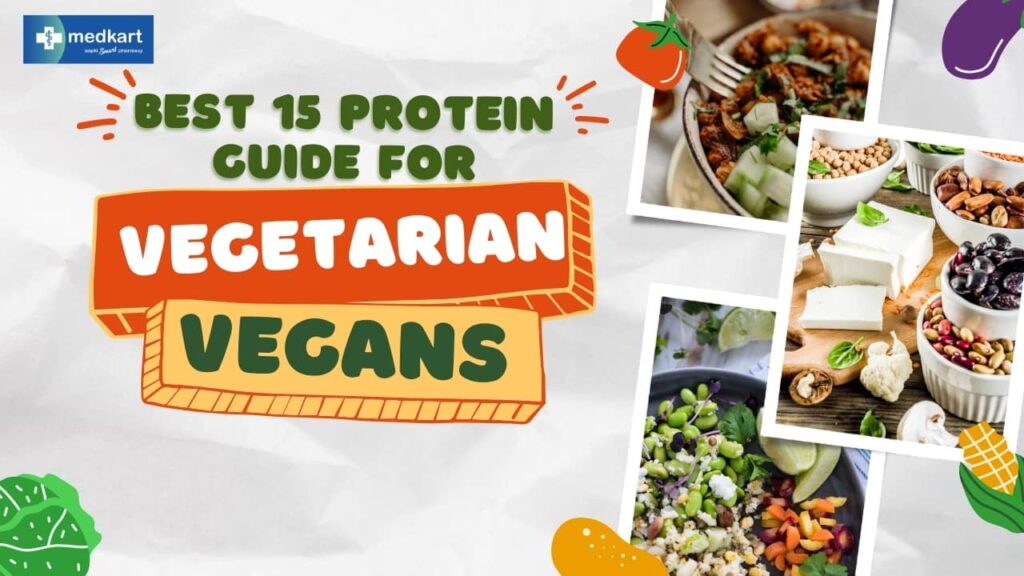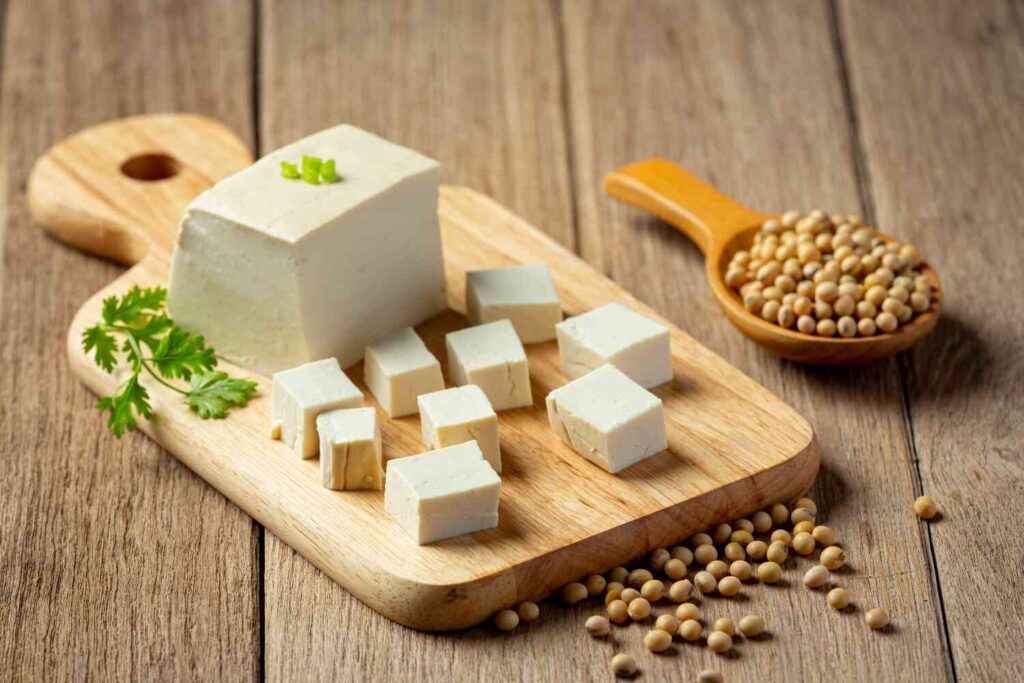Last updated on April 10th, 2025 at 12:26 pm

Protein is an essential macronutrient that supports muscle repair, immune function, and overall health. For vegans and vegetarians, meeting protein needs might seem challenging, but with the right knowledge, it’s entirely achievable. Protein is composed of amino acids, which serve as building blocks for the body’s tissues and systems. Some amino acids, known as essential amino acids, must be obtained through diet. Even though many people get their protein sources from meat and fish, it is possible to source them from plants when considered responsibly.
High Protein Vegetarian Foods
1. Lentils
Lentils contain 18 grams of protein per cooked cup. Other minerals present in lentils are iron, folate, and fibers which benefit a human by improving heart health and supporting digestion. Add lentils to soups, stews, or salads to serve as a filling meal.
2. Chickpeas
Chickpeas (garbanzo beans) contain 15 grams of protein per cooked cup. They can be used in hummus, roasted as a snack, or added to curries and salads.
3. Tofu
Tofu, made from soybeans, offers about 10 grams of protein per half-cup. It absorbs flavors well and is used in stir-fries, scrambles, and even desserts.
4. Tempeh
Tempeh, a fermented soybean product, contains 15 grams of protein per half-cup. Its firm texture makes it suitable for grilling, sautéing, or crumbling into dishes.
5. Quinoa
Quinoa is a pseudocereal that provides 8 grams of protein per cooked cup. It’s a complete protein, meaning it contains all nine essential amino acids. Use quinoa as a base for salads, bowls, or as a side dish.
6. Edamame
Edamame (young soybeans) has 18 grams of protein per cooked cup. They make an excellent snack or can be added to salads, soups, or stir-fries.
7. Seitan
Seitan, or wheat meat, is prepared from gluten and has 21 grams of protein per 3 ounces. It’s excellent for recreating the textures of meat in stir-fries, sandwiches, or stews.
8. Greek Yogurt (Vegetarian)
A vegetarian favorite, Greek yogurt provides up to 20 grams of protein per cup. Enjoy it with fruits or granola for a tasty and protein-rich snack or breakfast.
9. Cottage Cheese (Vegetarian)
Cottage cheese is another great vegetarian option, with 28 grams of protein per cup. It is versatile and goes well with both sweet and savory dishes.
10. Chia Seeds
Chia seeds contain 5 grams of protein for each 2 tablespoons; are rich in omega-3 fatty acids and fiber and can be added to puddings, smoothies or strewn over oatmeal.
11. Hemp Seeds
Hemp seeds contains a whopping 10 grams of protein per 3 tablespoons with its mild nutty flavor. Add these nuts to your smoothies or blend them into your salads and in baked goods.
12. Almonds
A serving of almonds, which is about 23 nuts, contains 6 grams of protein. They are also a good source of healthy fats, so they’re a great snack or added to oatmeal and smoothies.
13. Spirulina
Spirulina is a type of blue-green algae that offers 8 grams of protein per 2 tablespoons. Mix it into smoothies or sprinkle it on salads for a nutrient boost.
14. Oats
Oats provide 6 grams of protein per half-cup. They’re a hearty breakfast option and can be combined with nut butter or seeds for an extra protein punch.
15. Black Beans
Black beans deliver about 15 grams of protein per cooked cup. Use them in tacos, burritos, soups, or salads for a filling and nutritious meal.
Tips for Meeting Protein Needs
1. Combine Proteins for a Complete Amino Acid Profile
Pairing foods such as beans and rice, lentils and whole-grain bread, or hummus and pita can ensure you get all essential amino acids.
2. Include Protein at Every Meal
Make sure each meal contains a good source of protein to distribute your intake throughout the day.
3. Use a Protein-Rich Food Chart
Track your protein intake with a chart that includes serving sizes and protein content for your go-to foods.
High Protein Vegan Foods
Vegans get all their protein from plant-based sources. Here are three great choices for vegan protein foods:
1. Lentils
Lentils contain around 18 grams of protein per cooked cup. They are also very rich in fiber and iron, making them a great addition to soups, salads, or curries.
2. Chickpeas
Chickpeas contain 15 grams of protein per cooked cup. Legumes are versatile and easily fit into dishes like hummus, salads, or roasted snacks.
3. Tofu and Tempeh
Made from soybeans, tofu contains 10 grams of protein per half-cup while tempeh contains 15 grams of protein in one half cup. Tofu and tempeh can take flavors and thus serve best in stir-fries, sandwiches, or when grilled.

Best Vegetarian Protein Sources
Good sources of protein for vegetarians include lentils, chickpeas, and Greek yogurt, which are nutrient-rich and versatile. Paneer and cottage cheese are amongst the best high protein vegetarian foods, offering rich protein content and easy incorporation into meals. Pairing legumes with whole grains ensures a complete amino acid profile. These options make it simple for vegetarians to meet their protein needs. Vegetarians who consume dairy and eggs have additional protein options:
1. Greek Yogurt
In a serving of Greek yogurt, there are up to 20 grams of protein. Serve with fruits or nuts for a nutrient-rich snack.
2. Eggs
Eggs are an entire protein food source. For instance, one large egg holds 6 grams of protein, and they make excellent breakfast dishes or even bases for things like frittatas.
3. Cottage Cheese
Cottage cheese has about 28 grams of protein per cup. It is a great ingredient for both savory and sweet dishes.
Protein Rich Food Chart
Creating a protein rich food chart is an effective way to track intake. Here’s an example:
| Food | Serving Size | Protein Content |
| Lentils | 1 cup cooked | 18g |
| Quinoa | 1 cup cooked | 8g |
| Seitan | 3 ounces | 21g |
| Greek Yogurt | 1 cup | 20g |
| Tofu | ½ cup | 10g |
Protein Rich Food for Pregnancy
Protein needs increase during pregnancy to support fetal growth. High-protein options for vegetarians and vegans include:
- Chia Seeds : high in omega-3s and protein (5 grams per 2 tablespoons).
- Soy Milk : fortified cup provides 7 grams of protein.
- Almonds : a handful of protein and healthy fats in the form of 6 grams
Protein Rich Food for Weight Gain
People who want to gain weight should combine protein with foods that are high in calories. Some of the most common include:
- Nut Butters : peanut or almond butter provides about 8 grams of protein per 2 tablespoons.
- Smoothies : Combine protein-rich foods such as tofu, bananas, and almond milk to create a calorie-dense drink.
- Avocados : Although they are not high in protein, their healthy fats go well with protein sources for weight gain.
Vegan Diet Plan for Weight Loss
High protein vegan foods in diet can help in weight loss, due to it’s feeling of fullness. Here’s a sample meal plan:
- Breakfast : Chia pudding with almond milk and berries.
- Lunch : Quinoa salad with chickpeas, spinach, and tahini dressing.
- Dinner : Stir-fried tofu with broccoli and brown rice.
- Snacks : Roasted edamame or a protein smoothie with hemp seeds.
Conclusion
Meeting protein requirements as a vegan or vegetarian is entirely achievable with a well-balanced diet. By incorporating the foods and strategies mentioned, you can enjoy a nutritious, protein-packed lifestyle. Whether you’re looking to gain weight, support pregnancy, or include high protein vegan foods in your diet plan, plant-based proteins offer versatile, healthful solutions.
FAQs on Best 15 Protein Guide for Vegans and Vegetarians
1. What are the best vegan protein sources for a balanced diet?
Some of the best vegan protein sources include lentils, chickpeas, quinoa, tofu, tempeh, and edamame. These foods are rich in essential amino acids and provide additional nutrients like fiber, iron, and vitamins. Combining different plant-based proteins ensures a complete nutrient profile.
2. How can vegetarians obtain proteins for the day?
Vegetarians can obtain their daily requirements by intake of foods like Greek yogurt, eggs, paneer, cottage cheese, and legumes. By combining them with whole grains and nuts, one obtains numerous nutrients. Including high protein vegetarian foods in each meal ensures an even distribution of protein intake throughout the day.
3. Are plant-based proteins strong enough to build muscle?
Yes, plant-based proteins such as seitan, tofu, and lentils can be used for muscle building if taken in sufficient amounts. It is essential to combine them with strength training and a balanced intake of all the essential amino acids. Vegan protein powders can also supplement the diet.
Related Links :
12 High Protein Foods in Vitamin B12
Best Protein Food For Muscle Gain
Boost Your Health with Apricots
How to Increase Calcium in the Body
Top Dragon Fruit Benefits
Flaxseed Benefits for Skin
How to Gain Weight at Home
